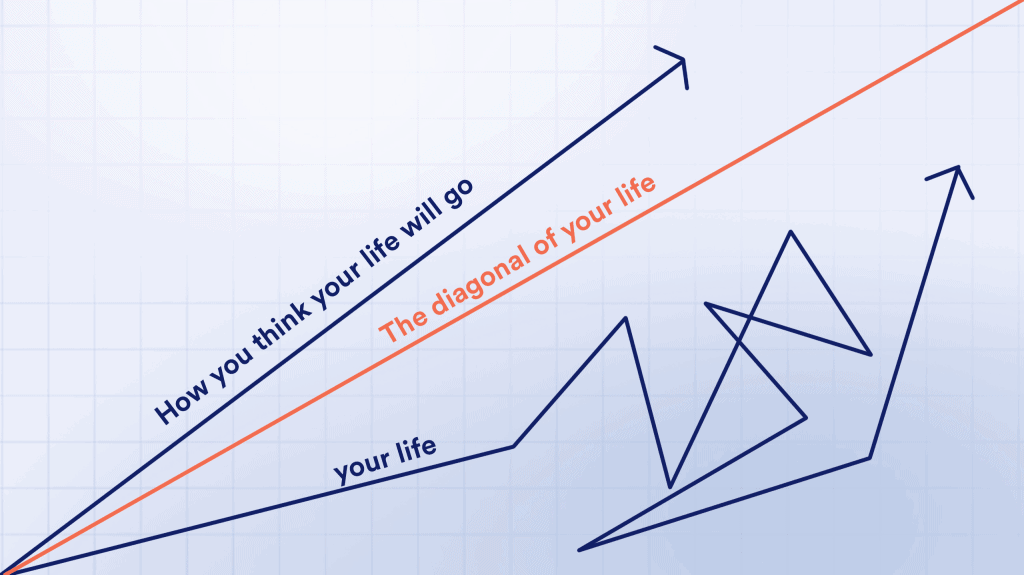
Jan 01 2026
- Lifestyle Design, Motivation
If I may offer something that helped me:
The diagonal of your life:
Stop trying to wrestle your life into submission.
Focussing on the end results and struggling harder will just result in burnout.
Set a general direction, create habits which steer you in that path,
but let go of controlling the exact trajectory.

Here’s a few tools which helped me:

I feel like I don’t have the qualifications. Like I don’t really know what I’m doing. I’ve never worked for a company doing any of the things I offer. I see plenty of people who are successful with less qualification than me, but I also see a lot more. I guess I’m comparing myself. – Alana, webflow designer
As someone who’s burned two degrees, qualifications are overrated!
Best to learn is by doing.
Sometimes that means selling stuff you are not sure how to do yet.
But you’ll figure it out!
It feels uncomfortable and scary, which is never nice but that uncomfortable feeling just means your in the growth zone.
It’s easy to compare yourself to others If your on social media you can’t avoid it.
But remember everyone has their own pace,
And most of the stuff you see on social is the cherry picked highlights anyway.
It’s always hard then you get a little win which gives you the energy to keep at it.

The only way to stay consistenyly motivated is by focussing on the doing instead of the outcome. I do this through my consistency review systems. I review on macro and micro scale daily, weekly, monthly and quarterly. Here’s a link to my process and consistency system for Solopreneurs.

No, a lifestyle business is a business model for entrepreneurs who value their freedom above all else.
It differs from traditional businesses models, such as the startup model, in several key ways:
Most people start their own business for freedom, get overwhelmed, put all their time into it, then fit life around whatever time remains.
This is because common culture promotes the startup model, where endless growth is prioritized at all costs.
The goal is to pump revenue as high as possible, with little regard for the people IN the business, and revenue is one of the only measures of success.
Success = your revenue.
For the entrepreneur, it’s a recipe for burnout.
If your goal is freedom, Then you need to build a lifestyle business.
A LIFESTYLE business is a business designed to prioritize profit and freedom first.
A lifestyle business is intentionally small, lean, and leveraged with little overheads.
A lifestyle business aims to put your life first and integrate your business into your lifestyle.
If you want lifestyle business, don’t use the wrong measuring stick.
A lot of people try to measure success by revenue.
In a lifestyle business, revenue means nothing.
Tell me about the profit.
That also means nothing, tell me your profit ÷ time.
Now we’re getting somewhere…
Now tell me what you do with your spare time.
Now you have a more accurate picture of your “success” in a lifestyle business.
A lifestyle business is the ideal model for a solopreneur who wants to have an intentionally designed lifestyle outside their business. 🙂

Working by itself has its advantages. But teamwork is something that suffers.
Any design is usually improved by input from multiple different perspectives, which can be hard to find when you work for yourself, by yourself.
Peer feedback is really important because it’s hard to see the trees when you’re thick in the forest.
You start second-guessing your own design choices, or worse,
become blind to your own mistakes and become stagnant.
No-one is perfect.
You’ll make mistakes.
You’ll miss things, and even the best output is still based just on your own perception of reality.
Designers will start with the exact same brief, and come up with a completley different design.
Criticism is the way we get better.
So first, ditch the defensiveness and embrace feedback and criticism.
You don’t need to action every bit of feedback you receive, it’s your design, and you have a thought process that (hopefully) makes sense.
But every piece of feedback has the potential to either improve the design,
or pen new avenues of thought.
Here’s a few techniques I use to combat this as a solopreneur.
If you’ve hit a wall, leave it, sleep on it.
Your brain will continue to work on things at rest,
You’ll come back to it with fresh eyes and all sorts of new ideas.
After I finish a project, I always go backwards.
I reread the brief to make sure I’m on point.
It’s easy to wander throughout the creative process until your way off brief.
I self-critique my own work from a super critical point of view.
Do a bit of roleplaying, I put myself in different shoes…
I like to put myself into a specific frame of mind, and approach the design in a few different roles.
Ask myself some hard questions as…
Usually, this brings my work up a notch, preaddresses issues and skips a few rounds of revisions or bouncebacks.
Find someone else in your niche, and swap about, ask and offer feedback when needed.
You will people in the same situation and stage as you on social media or other community groups.
I guarantee they’ll have the same problem and would welcome the chance to trade ideas and inspiration.
This a big solopreneur move which will help you stop seeing your peers as competitors, and start seeing them as partners or colleagues.
It doesn’t just stop at design.
I have a selection of peers I like to trade ideas with once a month.
It takes 5 minutes per person
I like to find…
Having an echo chamber like this leads to so many breakthroughs, and is beneficial for all parties.
Here’s some questions you can ask:
Just because you’re a solopreneur, it doesn’t mean you have to work alone.
You can have partners without having business partners.
You have access to an unlimited number of designers at your fingertips on social media, and in online communities.
Constructive criticism is something to embrace, not fear.

Sometimes It feels like we just cant win.
It seems like every year, we put more & more in, but get less and less back out.
Maybe the world is against us.
Maybe the game is rigged.
But we can choose how we lose.
And we can choose how we play, too.
The opponents may be cheating, The umpire may be biased, but we can still play fair.
As people become pinched at both ends
We often see the worst qualities of humanity come out.
People start putting themselves first.
They start taking more, and giving less, hoarding what they have.
They pull down others to push themselves up, then brag about their success on social media.
But even when margins are tight, We can find enough to survive & still live a good life.
Don’t join zero sum thinking or “dog eat dog” mentality.
We can still treat others with kindness, and be helpful.
The worse things get, the more important it becomes to do good & provide value where we can.
Being good ‘despite of’ is it’s own form of winning.
December 15, 2025TL;DR = too lazy, didn’t read.
July 29, 2025
After getting into an argument on linkedin recently,
I immediately regretted some stuff I said online.
I said I didn’t care much about world events because I don’t watch the news, which promptly earned me the label of “privileged”.
Maybe they were right, it was a poor choice of words and there’s a lot of suffering out there.
It’s not that I don’t care.
It’s that I only have so much attention to give,
and I’m not willing to give it up to a news cycle focussed on negative hyperbole.
So I then learned about a concept I wished I’d known sooner that would have saved me some trouble…
“Hitchens razer”, named for an author, states that:
Anything asserted without evidence, can be dismissed without evidence
This has since saved me from many pointless arguments online.
I don’t need to engage with everything I see.
How many hours have I lost crafting arguments online?
Or wasting my best energy on imagined comebacks to arguments that have already faded into the past?
Or spent all day stressing about news I can do nothing about?
The thing is I should know better!
In fact,I’ve already written about this myself
In life by design ep40 I was talking about cultivating an information diet of selective ignorance,
Which massively improved my wellbeing AND gave me improved ability to focus.
What activities give me flow?
What is required for flow?
In the next 10yrs, we’re heading for another dark age…
We’ll regress from capitalism to feudalism,
Yanis Varoufakis suggests in Technofeudalism
Big tech are the new kings
Governments are liege lords
The harvest is our data
Us?
We’re the serfs,
forced to labour in exchange for rent.
Netflix CEO said in this quote I find utterly monstrous:
“Our competition is sleep”
They want your attention 24/7,
glued to their apps every second of the day
producing data for harvest,
so they can sell your own desires back to you
in advertising and products you don’t need
Here’s how to reclaim your attention
March 24, 2025
This week I hit a major crisis of clarity.
I’ve made some quick wins, but my momentum has halted as I hit the hump.
I was feeling like I’d lost my way.
All week I sat at my computer, distracting myself with busiwork,
but not knowing what to work on.
Listening to a chapter of Dan Koe’s Art of Focus brought me clarity.
I opened it at random and just so happened to land on a chapter specifically about hitting the hump in any endeavour.
I realised the problem I was struggling with was not having too many tasks, the problem was I had no clarity.
I didn’t have anything to guide my focus and so my efforts all felt random.
Without clarity, I was trying to work on everything that came my way.
I was struggling mentally because my skills hadn’t yet developed to the point where I’m ready.
Which means I’m not getting the results I want.
Which is normal.
My anxiety was coming from the fact I was resorting to seeking new activities,
cramming my day with admin and busiwork,
Instead of just recommitting to the things that work.
I just need to stay the course and keep doing the right things every day.
As soon as I realised this I felt a wave of relief and joy washing over me.
I was already in the right place doing the right things.
I just need to keep doing it for a few more years haha.
Most stress is not caused by a lack of time or lack of skills, stress is caused by lack of clarity.
Now the path was clear.
I had moved away from my schedule so I was opening myself to choices.
Which was allowing lots of random non-needle moving tasks into my day.
So I set aside an hour,
I sat down and redesigned my schedule a bit as I have to get back to doing the same things every day.
May 9, 2024My schedule gives me clarity on what I *should* be doing instead of what I *could* be doing. Follow the process.
In the course of an average day, your brain processes 11 million bits per second.
That’s 14 billion bits of information over your life.
Your brain is always active. Always processing.
Whether you are solving problems in your business, brushing your teeth, watching TV, having sex or spending time with children.
Your brain is always processing information.
Right up until the moment it’s not and then everything stops for you.
Every time you take any action, you’re spending your bits of information.
The quality of your life is determined by the information your process over the duration of your life.
Learning to walk takes 5 years.
But then you spend the rest of your life doing it with almost zero effort.
We call this “muscle memory” but the label is false.
Rather, we reinforce pathways in our brain to make it more efficient to process information.
We carve grooves in our mind that allow information to flow like water in a channel.
This makes it easy to perform complex tasks on autopilot conserving our energy for other more important tasks
( Link to power of routines and habits article)
Stack your information into skills that help you flow or grow.
The unintended side effect is that we also reinforce biases that we hold.
This is the origin of the phrase
“you can’t reach an old dog new tricks”
We become more fixed into our habits and behaviours
Forging new habits, experiencing new things, keeping an open minds, learning new skills…
This is how you stay young forever.
I think of these X2 reinforcements every time I spend my attention watching a subpar Netflix show that doesn’t relax me,
Or waste my energy worrying about problems I can’t solve.
Or allow information that doesn’t help me and I can’t control into my life.
Or worry about things that have yet to pass.
Only spend energy doing things in front of you, or on planning so the right things come to be in front of you.
May 8, 2024
I’m just back from the trip of a lifetime, skiing in France.
3 years ago this type of holiday would not have been possible for us.
I count my blessings every day.
It was truly a fairy-tale place.
Cosy cabins, epic mountain scapes, misty godrays split through hazy treelines stretched across jagged whitecapped peaks stretching off impossibly tall into soft pink skies at sunset.
Everywhere Skiers slalomed their way gracefully down the slopes…
I was not one of these elegant figures.
It turns out “easy” routes in the Alps are equivalent of “difficult” in the UK and I haven’t skied in 15 years. 😅
Nevertheless, after about a day of faceplants and cartwheels, and impressive pirouettes, I found my ski legs and mustered what might even be called grace.

After the first day my legs were jelly!
I was expending all my effort trying to stop. to slow down my mass,
and I bludgeoned my way down the slope, mostly on my ass, sometimes on my face.
Whereas the experts spent a fraction of the effort, they simply leaned in, turned their ankles just a few degrees to redirect their angle down the slope….
flawless elegance and speed!
Not only did they spend a fraction of the energy but they got to the destination more quickly.
Plus they didn’t look like a fool.
They had a serene look of intense focus and joy.
Its the classic scalpel vs the sledgehammer. The sniper instead of the shotgun
Just another example of how a tiny bit of effort applied the right way,
has a much bigger impact than brute force and effort.
Where else can we apply this principle in your life and business?
April 29, 2024Where can we apply expertise instead of brute force to build leverage?
We all have thoughts like these.
But every obstacle is an opportunity to take responsibility, to learn, to harden yourself, to expand your mind, to create a good story for later.
Your behaviours are a series of habits.
carving a familiar groove into your brain,
like water running downhill.
You either become better at tackling your problems…
or better at procrastinating on important tasks.
April 23, 2024Each time you make a choice you are reinforcing a habit.
Your contact details will be private. The answer to your Question will be public so other solopreneurs learn from it.